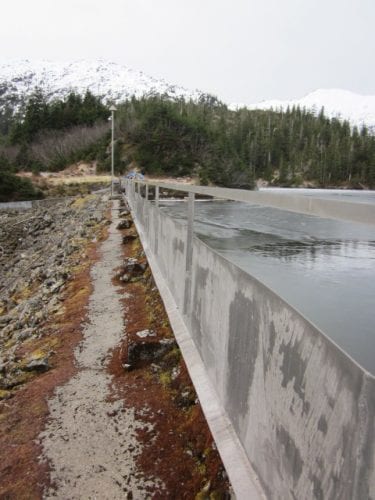
There’s rain and snow in the forecast for Southeast Alaska and that could mean some relief for dwindling hydroelectric resources. But even if reservoirs start refilling, the region’s drought is expected to have longer term impacts.
Petersburg has been running diesel generators around the clock for over a week but is still using some hydroelectric power. Bob Lynn is a borough assembly member and is Petersburg’s voting member on the board of the Southeast Alaska Power Agency, or SEAPA, the wholesale power provider for Petersburg, Wrangell and Ketchikan. Lynn provided an update on the situation to the borough assembly Monday.
“The water levels in both of the reservoirs are at very low and critical level,” Lynn said. “All three communities are operating a major part of their electrical loads off generators trying to minimize draw on the remaining water in the reservoirs.”
SEAPA stopped generating power at its Swan Lake plant near Ketchikan last Thursday. The power provider is still selling a small amount of hydro power from Tyee Lake to Wrangell and Petersburg. In addition, Petersburg is also burning a small amount of electricity from the borough’s hydro plant at Crystal Lake on southern Mitkof Island. Petersburg’s utility director Karl Hagerman says Wrangell and Petersburg combined are drawing down Tyee Lake by a tenth of a foot each day. That’s also the daily draw for Petersburg from Crystal Lake. At that rate and without any rain relief, there’s about 25 days left before Tyee Lake will be shut off, and an estimated 35 days before Crystal Lake nears its lowest ever recorded level. Crystal Lake reached that record low last summer. If diesel generators fail, there’s a small amount of reserve water left in the reservoirs and nothing beyond that.
Robert Larson is Petersburg’s alternate on the SEAPA board. He pointed out the financial impact this drought will have on the wholesale power provider.
“Because there’s a lack of water means of course they’re not selling any product,” Larson said. “So their budget is going to be at least 1.5 million dollars in the red for this year. That is an issue for them, It’s not that big of an organization that they can absorb that without some significant effects. So that’s something that’s in the works and we’ll see that again before this is all over with.”
The SEAPA board approved paying for diesel generation in Petersburg and Wrangell and because of that Petersburg’s assembly did not have a discussion about a local surcharge as planned. However, Lynn thought the decision could hasten an increase in the wholesale power rates. Utilities in the three communities have paid 6.8 cents a kilowatt hour for decades without an increase, among the cheapest electricity in the state. And high power sales some years have even led to rebates, essentially dropping that wholesale power rate further.
SEAPA was formed ten years ago by Wrangell, Ketchikan and Petersburg. In each of the last two years, the joint action agency has brought in over 12 million dollars in revenue from power sales.











